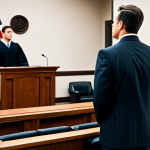Ever wondered who truly holds the ultimate power to protect your fundamental rights when everything else seems to crumble? It’s a question I’ve wrestled with, especially in our increasingly complex world where new challenges emerge daily.
At the heart of this critical safeguarding mechanism stands the Constitutional Court. It’s not just another branch of government; it’s the ultimate arbiter, the vigilant guardian of the nation’s foundational legal document.
My own understanding deepened when I saw how these courts step in to interpret ambiguous laws, ensuring they align with the spirit and letter of the constitution.
They act as a critical check on legislative and executive power, a final bulwark against potential overreach, upholding the delicate balance that defines a true democracy.
Think about it: in an era of rapid technological advancement, with AI challenging our very definitions of privacy and autonomy, or when global climate change demands radical policy shifts, who decides what’s constitutionally permissible?
The Constitutional Court is increasingly tasked with navigating these unprecedented waters. I’ve observed how cases now frequently involve digital rights, data protection, and even the constitutional implications of public health crises.
It’s not just about dusty old statutes; it’s about applying timeless principles to tomorrow’s problems, shaping our future by interpreting the very bedrock of our society.
The decisions made in these hallowed halls today will ripple through generations, defining our freedoms and responsibilities in ways we can barely imagine.
Let’s dive into the specifics and truly understand this vital institution.
Upholding the People’s Fundamental Liberties

When I first started delving into the intricacies of constitutional law, what immediately struck me was the sheer weight of responsibility resting on these courts.
It’s not merely about legal precedent; it’s about safeguarding the very essence of what it means to be a free individual in a democratic society. I’ve seen, time and again, how ordinary citizens, when faced with overwhelming governmental power or legislative overreach, find their last line of defense within the Constitutional Court.
It’s where the abstract ideals of freedom, equality, and justice get translated into tangible protections for everyday lives. From freedom of speech challenged by new digital regulations to the right to privacy in an increasingly data-driven world, the Court is constantly interpreting these timeless principles against the backdrop of modern complexities.
My personal takeaway? It’s a deeply human institution, where the outcomes of cases profoundly impact real people and their ability to live freely and pursue happiness without undue interference.
1. Safeguarding Individual Rights Against State Overreach
It feels almost empowering to know there’s an ultimate arbiter ready to step in when the state, however well-intentioned, oversteps its bounds. I’ve been fascinated by cases where the Court has had to draw clear lines, defining the limits of governmental authority.
This isn’t about hindering progress; it’s about ensuring that progress respects the fundamental dignity and liberties of individuals. For instance, consider privacy laws.
In an era where every click and every purchase can be tracked, the Court often faces the immense challenge of balancing national security with an individual’s right to digital anonymity.
It’s a delicate tightrope walk, but one they undertake with profound implications for all of us.
2. Ensuring Fair Process and Equal Protection Under Law
Beyond specific rights, the Constitutional Court is also the steadfast guardian of due process and equal protection. It ensures that everyone, regardless of their background, status, or beliefs, is treated fairly by the legal system.
I remember watching a documentary about a landmark case where the Court struck down a discriminatory law, and the impact it had on an entire community was palpable.
It wasn’t just a legal victory; it was a societal affirmation that fairness truly matters. This commitment to equality underpins the very fabric of our justice system and provides hope for those who might otherwise feel marginalized or unheard.
Navigating the Evolving Landscape of Modern Challenges
The world moves at an astonishing pace, and honestly, sometimes it feels like legal frameworks are constantly playing catch-up. But this is precisely where the Constitutional Court shines.
It isn’t just reacting to issues; it’s proactively shaping how foundational law applies to challenges that couldn’t possibly have been imagined when the constitution was drafted.
I’ve often thought about how fascinating it must be for the justices to grapple with questions that have no direct precedent, like the constitutional implications of artificial intelligence or climate change policies.
They’re not just interpreting old texts; they’re actively building the legal scaffolding for future generations. This demands not only deep legal expertise but also a profound understanding of societal shifts and emerging technologies, something I believe is incredibly demanding but crucial for a dynamic legal system.
1. Addressing Digital Rights and Technological Frontiers
The digital age has ushered in a torrent of new constitutional questions. I’ve personally experienced the frustration of feeling my online privacy erode, and it makes me appreciate the Court’s role in this domain even more.
Cases involving data collection, online speech, and the digital divide are becoming increasingly common. The Court is tasked with determining how timeless principles like free expression or privacy apply to the internet, social media, and AI algorithms.
It’s a constant effort to define legal boundaries in a world where technology evolves at breakneck speed.
2. The Constitutional Dimensions of Public Health and Environmental Issues
Who would have thought that a pandemic would lead to complex constitutional debates? Yet, it did. I witnessed firsthand how government responses to public health crises sparked discussions around individual liberties versus collective safety.
Similarly, environmental issues, from pollution regulations to land use, frequently land on the Court’s docket, forcing them to weigh economic development against the constitutional right to a healthy environment.
These are not easy questions, and the Court’s decisions in these areas deeply shape our collective well-being and the planet’s future.
The Delicate Art of Checks and Balances
From my vantage point, the Constitutional Court acts as the crucial fulcrum in the intricate machinery of governance. It’s where the rubber meets the road when it comes to legislative ambition and executive power.
I often picture it as a wise, steady hand, ensuring that no single branch of government becomes too dominant, preserving the careful equilibrium that defines a functioning democracy.
This isn’t about opposition; it’s about necessary oversight and ensuring accountability. It provides a vital safety net, catching potential errors or abuses before they cascade into wider societal problems.
When I reflect on what truly distinguishes a robust democracy, this independent judicial review is consistently at the top of my list.
1. Reviewing Legislation for Constitutional Adherence
This is, arguably, one of the most visible roles. I’ve seen numerous instances where a law, passed by elected representatives, is challenged for not aligning with the constitution.
The Court then meticulously examines the law, often holding public hearings, before delivering a ruling that can fundamentally alter policy. This critical review ensures that even the will of the majority respects the fundamental rights of all citizens, acting as a safeguard against majoritarian overreach.
It’s a cornerstone of constitutionalism that I believe we often take for granted until we need it most.
2. Limiting Executive Power and Ensuring Accountability
It’s not just laws; the actions of the executive branch are also subject to review. From emergency decrees to administrative regulations, the Court can step in if these actions are deemed unconstitutional.
I recall a significant case where an executive order was challenged, and the Court’s decision underscored the principle that even the highest office must operate within the bounds of foundational law.
This level of oversight is essential for preventing authoritarian tendencies and upholding the rule of law. It’s about ensuring that power is exercised responsibly and within defined legal parameters.
Protecting Vulnerable Populations and Minority Voices
One of the aspects of the Constitutional Court’s work that I find most compelling, and frankly, most inspiring, is its role in defending the rights of those who might otherwise be marginalized or unheard.
Democracy, while inherently about majority rule, must also protect minority rights and ensure the dignity of every individual. I’ve often thought about how challenging it must be to stand as the last line of defense for groups who face systemic disadvantages, but this is precisely where the Court’s moral authority truly shines.
It’s not always popular, and sometimes its decisions face backlash, but that’s often a sign that it’s fulfilling its crucial role as a beacon of justice for all.
1. Advancing Social Justice and Equality
I’ve witnessed how the Court has been instrumental in chipping away at long-standing societal inequalities. Whether it’s through landmark rulings on discrimination based on race, gender, religion, or sexual orientation, the Court has consistently pushed for a more inclusive and equitable society.
These are often emotionally charged cases, but the Court’s commitment to upholding the principle of equal protection for all is unwavering. It’s a slow but steady march towards true justice, powered by the Court’s adherence to constitutional ideals.
2. Ensuring Fair Representation and Democratic Participation
Beyond individual rights, the Court also plays a vital role in ensuring the integrity of the democratic process itself. This includes issues like voting rights, electoral boundaries, and campaign finance.
I’ve seen cases where the Court has intervened to protect the right to vote for all citizens, or to ensure that political systems are fair and representative.
These decisions, while seemingly technical, have a profound impact on who participates in democracy and how their voices are heard, underscoring the Court’s role in maintaining a healthy, vibrant democratic society.
The Constitutional Court’s Impact: Beyond the Bench
The ripple effect of the Constitutional Court’s decisions extends far beyond the legal community. I’ve observed how a single ruling can reshape public policy, alter societal norms, and even influence international legal discourse.
It’s a testament to the profound authority and influence wielded by this institution. When the Court issues a decision, it’s not just a judgment on a specific case; it’s an interpretation that guides future legislation, executive actions, and even individual behavior.
This far-reaching impact is what makes understanding the Court so essential for anyone interested in the future of our societies. Their interpretations of fundamental law become the guiding principles for generations to come, truly shaping the world we live in.
| Area of Impact | Examples of Influence | Societal Benefit |
|---|---|---|
| Legislation & Policy | Invalidating unconstitutional laws, guiding new policy development. | Ensures laws align with fundamental rights and principles. |
| Human Rights & Liberties | Expanding protections for privacy, speech, equality. | Strengthens individual freedoms against potential overreach. |
| Democracy & Governance | Upholding fair elections, balancing governmental powers. | Maintains checks and balances; promotes accountable government. |
| Social & Cultural Norms | Influencing public discourse on justice, equality, and human dignity. | Contributes to a more inclusive and just society. |
1. Shaping Public Policy and Legislative Agendas
I’ve personally followed how a major Constitutional Court ruling can immediately send shockwaves through the legislative branch, prompting lawmakers to reconsider or rewrite existing laws.
It’s fascinating to see how the Court’s interpretations become blueprints for future policy, guiding everything from environmental regulations to healthcare reforms.
This isn’t just about striking down laws; it’s about providing clear directives that help shape a constitutionally sound future. It’s like having a wise, experienced editor for the nation’s legal script.
2. Influencing International Legal Standards and Discourse
It might surprise some, but the decisions made by a Constitutional Court can actually resonate on a global scale. I’ve noticed how other nations, and even international legal bodies, often look to prominent constitutional rulings from various countries for guidance, particularly on emerging issues like digital rights or environmental law.
This exchange of legal thought contributes to a broader understanding of human rights and democratic principles worldwide, making the Court’s work not just nationally significant but globally influential.
Wrapping Up
As I reflect on the incredible scope and profound impact of the Constitutional Court, I’m left with an even deeper appreciation for its role in upholding the very fabric of our democratic societies. It’s truly a testament to the foresight of those who crafted foundational laws, creating an institution designed to be a steadfast guardian of liberty and justice. My journey through understanding this institution has only underscored how its seemingly abstract decisions translate into tangible protections for real people, everyday, shaping the quality of our lives and the future of our nations. It’s a humbling reminder of the constant vigilance required to maintain a free and fair society, and the invaluable work of those who serve on this crucial bench.
Good to Know
1. Understanding Court Decisions: Most Constitutional Courts publish their full judgments online. Learning to navigate these public databases can offer incredible insight into the reasoning behind landmark rulings and how they impact you.
2. Independence is Key: The strength of a Constitutional Court lies in its independence from the executive and legislative branches. This separation of powers is crucial for impartial judgment and preventing abuses of authority.
3. Your Rights are Dynamic: Constitutional rights aren’t static; they are constantly being interpreted and reinterpreted by the Court in light of new societal challenges, from digital privacy to environmental concerns. Staying informed means understanding these evolving interpretations.
4. Beyond Legal Technicalities: While rooted in law, the Court’s decisions often have significant ethical, social, and economic implications, shaping public policy and societal norms far beyond the courtroom.
5. Citizen Engagement: Many Constitutional Courts welcome submissions from the public (amicus curiae briefs) in cases of significant public interest, offering a pathway for civil society to contribute to the legal discourse.
Key Takeaways
The Constitutional Court stands as an indispensable pillar of democracy, primarily safeguarding individual liberties against potential state overreach and ensuring equal protection under the law for all citizens. It continually adapts fundamental legal principles to address modern challenges, particularly in digital rights and environmental issues. Crucially, the Court acts as a vital check and balance, reviewing legislation and limiting executive power to uphold accountability. Furthermore, it plays a pivotal role in protecting vulnerable populations and advancing social justice. The Court’s decisions extend far beyond the courtroom, profoundly shaping public policy, influencing international legal standards, and molding the very norms of society, making it a cornerstone for a just and equitable future.
Frequently Asked Questions (FAQ) 📖
Q: You mentioned the Constitutional Court isn’t just “another branch of government.” What truly sets it apart, and why should I care about its distinct role?
A: Ah, that’s a question that really gets to the heart of it, isn’t it? For the longest time, I just thought, “Court’s a court, right?” But I quickly learned that the Constitutional Court operates on an entirely different plane.
It’s not about settling individual disputes like a local claims court, nor is it merely reviewing the technicalities of a law. What makes it unique, what makes it vital, is its singular focus: safeguarding the very blueprint of our society – the constitution.
Think of it this way: when I bought my first car, I got a user manual. This court is like the ultimate mechanic, ensuring the entire vehicle of government — the engine (executive), the chassis (legislature), the wheels (other courts) — is running according to the original, foundational design.
They step in when laws, even well-intentioned ones, drift from that core principle. I’ve seen firsthand how a single ruling can send ripples, forcing lawmakers to rethink things, or protecting a minority group’s rights when it felt like no one else would.
It’s about preserving the spirit of freedom and justice, not just the letter of a thousand individual rules.
Q: It seems like we’re facing brand new challenges every day, from
A: I to climate change. How does an institution built on, well, potentially “dusty old statutes” as you put it, even begin to tackle such unprecedented issues?
A2: Believe me, I’ve asked myself that exact question many times. It’s easy to dismiss these courts as relics, dealing with problems from a bygone era.
But what has absolutely floored me, in a good way, is how incredibly nimble they actually are when it comes to applying timeless principles to tomorrow’s problems.
It’s less about dusty statutes and more about applying foundational values. Take the sheer explosion of AI and data privacy concerns. While our founders didn’t have “gigabytes” in their vocabulary, they deeply understood the concept of individual liberty and unreasonable searches.
The Constitutional Court steps into that void, interpreting those bedrock rights – like privacy or free expression – in the context of digital surveillance or algorithmic bias.
I recall a case where I thought, “How on Earth will they rule on that? There’s no precedent!” Yet, they found a way, drawing parallels, meticulously building arguments that bridge the past with an utterly futuristic reality.
It’s watching intellectual alchemy happen, truly. They’re not just guardians of what was; they’re actively shaping what will be.
Q: You talked about decisions rippling through generations. Can you give a more concrete sense of how the Constitutional Court’s rulings actually affect my everyday life, or the freedoms I might take for granted?
A: That’s the million-dollar question, isn’t it? It’s easy to view these courts as operating in some lofty, detached ivory tower, making decisions that only impact lawyers and politicians.
But I’ve come to realize just how deeply their work touches all of us. Think about your freedom to express an opinion online without fear of immediate censorship, or your right to privacy when your data is collected.
These aren’t just abstract ideas; they are often the direct result of Constitutional Court rulings that have upheld those very principles against legislative overreach or technological advancement.
I remember a time when a new law was proposed that, frankly, felt like it was stepping all over individual freedoms – and the collective sigh of relief when the Constitutional Court intervened and said, “Hold on, that doesn’t align with our foundational values.” It’s that ultimate check, ensuring that even in moments of public panic or political expediency, the core tenets of democracy aren’t eroded.
They provide the bedrock for everything else – from how fair an election is to whether you can challenge an unfair government action. They’re the uncelebrated heroes making sure the very ground you stand on is solid.
📚 References
Wikipedia Encyclopedia
구글 검색 결과
구글 검색 결과
구글 검색 결과
구글 검색 결과
구글 검색 결과






